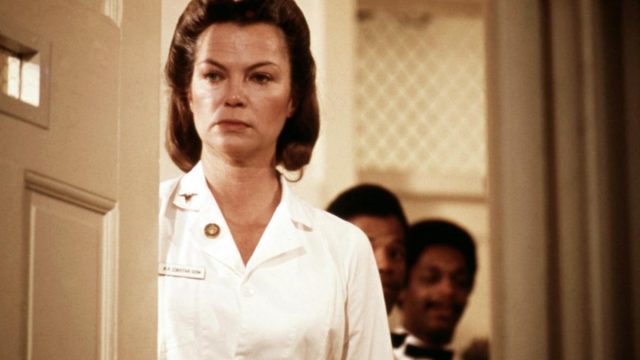Hating Iron Fist is popular right now, and I won’t say it’s not without cause. I’m not quite prepared to jump on that bandwagon, though I can see it coming down the block. However, what really got me about the few episodes we’ve seen so far was not the blandness of its star or the lackluster nature of its fighting sequences or its following Lucas down the trail of thinking we really care about boardroom shenanigans in our superhero show. It’s the mental hospital.
I don’t deny that there is a certain ease to the idea that you can lock a character up in an institution and get them out of other characters’ way. The problem is that it doesn’t work that way. Oh, it was appalling and accurate in Changeling, a movie I thought was very good but will never watch again. Because when a movie is set matters, and Changeling is set before changes in how we deal with mental health in the United States. It was possible for someone troublesome to be locked up and just called mentally ill because they’re causing a problem. Laws in the United States make that extremely difficult now.
And I mean, even say that weren’t true—coupled with the There Are No Therapists, this means that practically the only time we see mental health care in American media is when we see someone in a mental hospital is when they aren’t supposed to be there. In the scene in Iron Fist, one of the other characters tells Danny how long the various patients have been there, all for seemingly nothing. One has been locked up for fifteen years.
Perhaps worse, there is also the character who murdered his family with an axe and “got off on an insanity plea.” First off, anyone who was found not guilty by reason of insanity wouldn’t end up in the same open ward with people who were just schizophrenic or something. And second and more importantly, a person in that situation is now serving an indefinite sentence, and few people succeed in the defense. It takes more than just a bare claim, and the goal of the system is then to fix the illness—or, if it cannot be fixed, to prevent the person from harming others again. In fact, it’s about the only way you can be locked in a mental hospital against your will these days.
In fact, that’s one of the only things I like about One Flew Over the Cuckoo’s Nest, in most respects a deeply offensive film to me. (I haven’t read the book, because why would I do that?) McMurphy (Jack Nicholson, of course) is astonished to discover that, if he’s in there on an insanity plea, he’s in there until they decide he’s cured. In general, people on an insanity plea serve longer sentences than people who go to prison. It’s not exactly a get-out-of-jail-free card in most cases.
The United States doesn’t have enough beds in psychiatric facilities to treat all the people who need treatment—it has something like ten percent of the beds that are actually needed. And that’s for both long-term and short-term treatment, both the person who literally cannot function outside the institution and the person who needs a few days of intensive treatment to get their head in place and their support structure set up after a suicide attempt. In my home state, there’s a battle between the VA hospital and the public mental hospital to have enough psychiatrists to treat everyone they do have beds for, because there aren’t enough psychiatrists even for that reduced number of beds. It’s a real problem, and it’s one of the things driving prison overcrowding—the severely mentally ill are more likely to end up in prison simply because it is the only treatment they will have access to.
If you are aware of the real, serious problems of the mental health care system, it is harder and harder to take pop culture mental hospitals with a grain of salt as you are expected to. Almost no one actually gets help in these hospitals. At best, they are holding wards for the wacky background characters to Our Hero, who is in there for reasons that shouldn’t even count. At worst, they are cruel prisons where murderers roam relatively free and harmless eccentrics are medicated into catatonia. No one here is getting help, and it’s not for the reason that not enough mentally ill people are getting help in the real world.
So what’s the problem? Public perception influences, among other things, public funding, and the majority of mental hospitals are publicly funded. They provide a public service, ensuring treatment for people whose costs would be prohibitive to provide for themselves, especially since the mentally ill aren’t great at being able to earn money. The reason there aren’t enough psychiatrists goes more toward how expensive it is to become a psychiatrist, I suspect, but there could be more therapists if we didn’t have the stigma against mental health care that we have. There are a lot of ways to fight the stigma, but I believe that one of them is fighting the portrayal of the mentally ill in pop culture. Iron Fist has a lot wrong with it, but that doesn’t mean we should be ignoring this.

